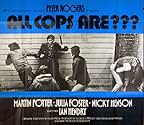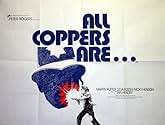A young policeman and a small-time crook are both involved with the same girl.A young policeman and a small-time crook are both involved with the same girl.A young policeman and a small-time crook are both involved with the same girl.
- Director
- Writer
- All cast & crew
- Production, box office & more at IMDbPro
Featured reviews
All Coppers Are isn't exactly a classic - but it's definitely a product of its time. Produced by 'Carry on' Peter Rogers (with a music score from Gerald Thomas), it's another attempt by them to branch out into something grittier and more realistic - hot on the heels of the movies 'Assault' & 'Revenge' over the previous couple of years.
It has an interesting cast, and lots of good period location filming around Battersea - but in some ways this is the most interesting part of the film. It starts off brightly enough as we get to know the characters, and the story involving a young copper and a petty criminal both vying for the charms of the same girl (played by Julia Foster) sounds promising.
The problem seems to lie with the enforced 'grittiness' - it never really feels authentic, and is more like a parody of working class London at that time. It comes across as a little stilted, and doesn't have the same beating heart at its centre as similar 'kitchen sink' films from previous years (such as 'Alfie'). The story ultimately doesn't seem to reach a satisfying conclusion, send out any particular moral message, or leave any lasting impression.
Having said that, there's still plenty to enjoy if you're a fan of early 70s Brit-movies - it's lovely to see a working Battersea power station in the background of a few scenes, and the cast do their best to liven up quite a thin script.
It's very much a period piece - not the worst of its genre, but far from being the best... it's a fair cop.
It has an interesting cast, and lots of good period location filming around Battersea - but in some ways this is the most interesting part of the film. It starts off brightly enough as we get to know the characters, and the story involving a young copper and a petty criminal both vying for the charms of the same girl (played by Julia Foster) sounds promising.
The problem seems to lie with the enforced 'grittiness' - it never really feels authentic, and is more like a parody of working class London at that time. It comes across as a little stilted, and doesn't have the same beating heart at its centre as similar 'kitchen sink' films from previous years (such as 'Alfie'). The story ultimately doesn't seem to reach a satisfying conclusion, send out any particular moral message, or leave any lasting impression.
Having said that, there's still plenty to enjoy if you're a fan of early 70s Brit-movies - it's lovely to see a working Battersea power station in the background of a few scenes, and the cast do their best to liven up quite a thin script.
It's very much a period piece - not the worst of its genre, but far from being the best... it's a fair cop.
I really can't recommend this movie, Sat through it in an early morning bout of insomnia, Set/Made in a working class district of London in the late 60s early seventies., The plot consists of the two men vying for the affections of a an attractive young lady living in a council flat. One a rather obnoxious crim type (I suspect he's meant to be a ladies man but the rather dated attitudes make him seem a sleaze) and one a copper (married as well). I think the film was trying to say something about class relations, male/female relationship etc etc, and while the acting is adequate the stodgy plot never raises it above the mediocre. Pluses are the sixties feel and location that is like a little window to a vanished world & lots of street scenes of London at this time, I think the large power station which dominates the area where the characters live is now a modern art gallery.
Not really watchable as entertainment but fairly revealing if we're looking for insight into the varying mindsets of film makers of the time. Peter Rogers, whose company produced this, had put out Carru On Camping a couple of years before. That film had ended with a scene where a bunch of hippies were driven from a field by the film's main protagonists. In other words a victory for the sensible silent majority over the unwashed hordes threatening to corrupt society. It was part of a trend in the later Carry Ons where they became part of a kind of mainstream reactionary backlash against the 'counter culture'. In this film there is a 'protest demo' scene which continues this theme and tries to replicate the same type of battle in a more serious setting and besides being appallingly badly done it is unashamedly biased. Waving a banner about student grants , the protesters isolate a police officer and in cold blood surround him and badly beat him. Because of their grants, presumably. It makes those dreadful old political cartoons by Cummings in the Express look enlightened. Some interesting external shots though.
All coppers are has a lot going for it. Set in gritty London of the 70s. Its the story of 2 men on opposing sides of the law. It features a strong cast and even a fresh faced David Essex. But the it tends to lack the courage of its convictions. Where the story should have been at its strongest the makers seemed to have lacked the courage to carry it through. Also most of the characters are very unsympathetic. The film does have its moments but it could have been so much better.
All Coppers Are... comes across as a slice of life kitchen sink drama of the 1960s. Only it was made in the early 1970s after the worldwide student protest movement of the late 60s.
This was the time when Carry On producer Peter Rogers who also produced this movie started to rebel against the swinging 60s to become a bit of a reactionary.
Set in Battersea. Young policeman Joe (Martin Potter) is married with a baby but gets to have a bit of fun with flighty Sue (Julia Foster) who he met at a party. Joe neglects to mention that he is married and a policeman.
Joe also befriends petty crook Barry (Nicky Henson) who he confesses to about his marital status but no his job.
Barry is also attracted to Sue and they become a couple when they find out more about Joe. Barry is also planning a cigarette warehouse robbery, if only he drove a less conspicuous car. You just know Barry's heist will go wrong and he will come face to face with Joe.
This is story with a thin plot. It was obviously inspired by the French New Wave but it lacks a ballsy approach.
The film's open ended conclusion does it no favours. The protest scene although well filmed seemed to be about nothing apart from young radicals wanting to have a punch up with coppers. It just highlights that the wrong people were involved in the movie as it had no social commentary. Their sympathies were with Barry, being a copper is a hard and dangerous life.
It needed genuine leftist filmmakers to show that times are changing.
This was the time when Carry On producer Peter Rogers who also produced this movie started to rebel against the swinging 60s to become a bit of a reactionary.
Set in Battersea. Young policeman Joe (Martin Potter) is married with a baby but gets to have a bit of fun with flighty Sue (Julia Foster) who he met at a party. Joe neglects to mention that he is married and a policeman.
Joe also befriends petty crook Barry (Nicky Henson) who he confesses to about his marital status but no his job.
Barry is also attracted to Sue and they become a couple when they find out more about Joe. Barry is also planning a cigarette warehouse robbery, if only he drove a less conspicuous car. You just know Barry's heist will go wrong and he will come face to face with Joe.
This is story with a thin plot. It was obviously inspired by the French New Wave but it lacks a ballsy approach.
The film's open ended conclusion does it no favours. The protest scene although well filmed seemed to be about nothing apart from young radicals wanting to have a punch up with coppers. It just highlights that the wrong people were involved in the movie as it had no social commentary. Their sympathies were with Barry, being a copper is a hard and dangerous life.
It needed genuine leftist filmmakers to show that times are changing.
Did you know
- TriviaThe street riot scenes were all shot on the exterior Baker Street standing set at Pinewood that had been constructed the previous year for the movie The Private Life of Sherlock Holmes (1970). This street appears in other films/TV series shot at Pinewood around this time too, including The Amazing Mr. Blunden (1972), Carry on at Your Convenience (1971), The Persuaders! (1971) and UFO (1970). Some of the footage of the riot scenes was later re-used for the 1978 episode Look After Annie (1978) of the TV series The Professionals (1977).
- Crazy creditsThe lettering in the opening title sequence and the closing caption "The End" was in a handwritten font, to mimic the graffiti used for the film's title "All Coppers Are [Bastards]".
- ConnectionsEdited into The Professionals: Look After Annie (1978)
Details
- Release date
- Country of origin
- Language
- Also known as
- All Cops Are
- Filming locations
- Battersea, London, Greater London, England, UK(apartment block exteriors/various exterior street scenes)
- Production companies
- See more company credits at IMDbPro
- Runtime
- 1h 27m(87 min)
- Sound mix
- Aspect ratio
- 1.66 : 1
Contribute to this page
Suggest an edit or add missing content































